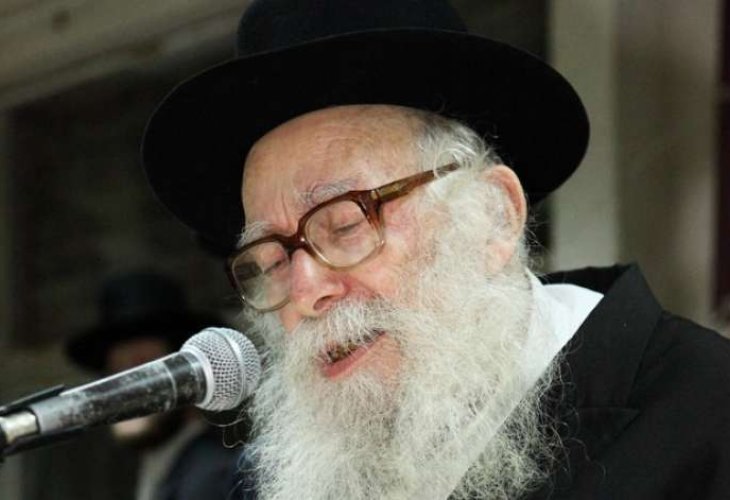Torah Personalities
Honoring Our Parents: The Halachic Legacy of Rabbi Nissim Karelitz
Two years after his passing, Rabbi Karelitz’s clear rulings continue to guide how Jews navigate the mitzvah (Divine commandment) of honoring one's parents in everyday life
 Rabbi Karelitz of blessed memory (Photo: Yaakov Nachumi, Flash 90)
Rabbi Karelitz of blessed memory (Photo: Yaakov Nachumi, Flash 90)A Clear Voice in Halacha (Jewish Law)
This week marks two years since the passing of Rabbi Nissim Karelitz, one of the foremost halachic (Jewish legal) authorities of his generation. In his rulings, Rabbi Karelitz offered clear and thoughtful guidance on how to fulfill the mitzvah (Divine commandment) of kibbud av va’em (honoring one’s father and mother), as outlined in the Shulchan Aruch (code of Jewish law).
His rulings address many modern-day questions: Is a child obligated to obey if his parents oppose a marriage choice or a decision to study in a specific place? What if a parent makes unfair demands, or insists the child go to bed early, or not act as a guarantor on a loan? Can a child shorten or change a complicated family name if the parent objects? Rabbi Karelitz also emphasized that parents must be cautious not to make excessive demands on their children.
Respect, Sensitivity, and Boundaries
Rabbi Karelitz ruled on emotionally complex situations with a sensitivity grounded in halacha. For example:
If a parent asks a question and the truthful answer would cause them distress, how should the child respond?
May one say “I don’t want to” or “I’m too busy” to a parent’s request?
If a parent asks for an opinion and the child disagrees—how should it be expressed?
What defines “contradicting” a parent’s words in today’s world?
He also addressed how to speak about one’s parents in daily life. Is it permissible to refer to a parent by name when being called to the Torah or dealing with office paperwork? How should a grandson be named after a living grandfather?
Additional questions include: Can a child fulfill their obligation to honor parents through a third party? What happens if a parent causes emotional pain or a child cuts off contact? If parent tells the child not to stand in their honor, can that respect be waived permanently?
The Mitzvah in Practice
Rabbi Karelitz delved into questions of honoring parents even after their passing. Is one obligated to visit a parent’s grave if it causes inconvenience or Torah study is interrupted? What about traveling to the graves of righteous individuals abroad? And how should one care for parents suffering from cognitive decline?
Rabbi Karelitz followed the teachings of the Brisker Rav and the Chazon Ish with regard to the halachic princiople of standing for a parent: What is the nature of this obligation? How many times daily? Can parents waive this honor entirely? From which age should a child be taught to abide by this practice?
He also addressed difficult scenarios: If a parent throws their child’s money into the sea, halacha says the child must remain silent and accept the decree. But what if the child can prevent the loss by shaming the parent, what should be done? Rabbi Chaim Soloveitchik weighed in on this as well.
Select Rulings from Rabbi Karelitz:
If elderly parents become overly demanding and the child cannot meet their needs properly, but the parent has money, the child may use the parent’s funds—even without permission—to hire someone to help, as this is considered the parent's own need.
If a child cannot manage their parent’s care unless paid, they may take a salary from the parent's money—even without the parent’s awareness—if it enables them to provide appropriate care.
One who disgraces a parent falls under the Torah curse, “Cursed is the one who dishonors his father or mother” (Devarim 27:16). Rabbi Karelitz explains that this includes not only verbal abuse but also disregarding a parent’s request in their presence, even silently.
Rabbi Karelitz further rules that mocking or belittling parents—even subtly or in private—is also considered dishonor. This includes jokes about their lack of understanding of modern life, their customs, or speech, even when speaking to a spouse or children.
In summary, he writes: “The essence of the mitzvah is to honor and revere one’s parents, and certainly not to disrespect or contradict them.”
Through his rulings, Rabbi Nissim Karelitz offered practical halachic direction rooted in deep reverence for both parents and tradition. Even after his passing, his clarity helps individuals navigate complex family dynamics with integrity, compassion, and unwavering commitment to the mitzvah.

